Eisenhower Leadership Prize Ceremony Program and Remarks
Title
Date
Contributor
Summary
This document is a program booklet for the Eisenhower Leadership Prize ceremony held on May 20, 1997, in Washington, D.C. It features a key address by Nobel Laureate Elie Wiesel, who received the prize. Wiesel's remarks center on the Holocaust, the profound impact of the liberation of concentration camps by American soldiers, and the critical importance of memory in preventing future atrocities. He recounts the horrors he witnessed and expresses deep gratitude to the liberators. The booklet also includes concluding remarks by D. David Eisenhower II, reflecting on the historical significance of World War II and the Eisenhower family's legacy. Additionally, the document provides detailed information about the Eisenhower World Affairs Institute's mission, its various scholarship and program initiatives, and lists its board members and Gettysburg College trustees. The overall theme emphasizes remembrance, valor, justice, and the enduring quest for human liberty.
More Sources Like This
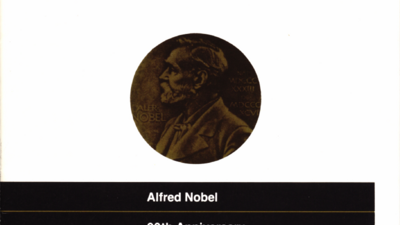
This booklet serves as a memento of the proceedings for the 90th Nobel Anniversary Dinner, held at the New York Hilton on December 9, 1986. The event commemorated Alfred Nobel and honored American Nobel Laureates. The document includes a proclamation from New York City Mayor Edward I. Koch, a message from President Ronald Reagan advocating for peace in a nuclear age, and a message from Pope John Paul II emphasizing unity and cooperation. Dr. Henry A. Singer, Executive Officer of the American Nobel Anniversary Committee, played a key role in the compilation. Illustrated with photographs, the booklet features prominent attendees and speakers, including co-chairmen Dr. Henry Kissinger and Warren Anderson, Nobel Peace Prize winner Liv Ullman, and U.S. Ambassador Vernon Walters. It also details future initiatives such as biannual American Nobel Convocations and the establishment of American Nobel Laureate Fellowships to support emerging scientists and researchers, reflecting the ongoing commitment to recognizing and fostering contributions to humanity.
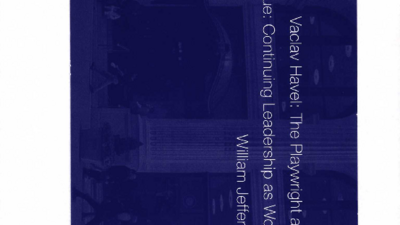
This is a formal invitation from The Graduate Center of The City University of New York to an event titled "Vaclav Havel: The Playwright as President" with a dialogue on "Continuing Leadership as World Citizens." The invitation, issued by the university's president, Frances Degen Horowitz, announces the distinguished speakers: Václav Havel, President of the Czech Republic; William Jefferson Clinton, former President of the United States; and Elie Wiesel, Nobel Laureate. The event was scheduled for Friday, September 20, 2002, at 5:00 p.m. in the Harold M. Proshansky Auditorium at The Graduate Center in New York City. The document provides the full address, RSVP details including a phone number and a deadline of September 1, and credits Rick Bak for design and Jason Fulford for photography.
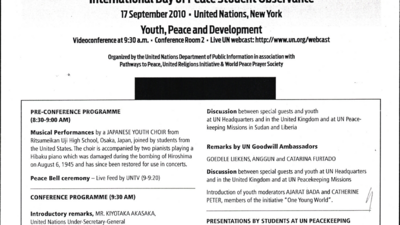
This document outlines the program for the International Day of Peace Student Observance held on September 17, 2010, at the United Nations in New York, focusing on "Youth, Peace and Development." Organized by the UN Department of Public Information in association with Pathways to Peace, United Religions Initiative, and World Peace Prayer Society, the event included a pre-conference program with musical performances by a Japanese youth choir and a Peace Bell ceremony. The main conference featured introductory remarks by UN Under-Secretary-General Kiyotaka Akasaka and a welcome address by UN Secretary-General Ban Ki-Moon. Special guests included UN Messengers of Peace Jane Goodall, Elie Wiesel, and Midori, and UN Goodwill Ambassadors Yuna Kim, Goedele Liekens, Anggun, and Catarina Furtado. Students from various locations, including UN peacekeeping missions in Sudan and Liberia, participated via videoconference, presenting on topics like "Voices for Faith in Conflict" and the African Union Initiative's "2010 Year of Peace and Security in Africa." The program also included a flag ceremony, a minute of silence, and a closing performance. It lists numerous participating schools and organizations involved in peace and development initiatives, and details the eight Millennium Development Goals and the objectives of the International Year of Youth (2010).
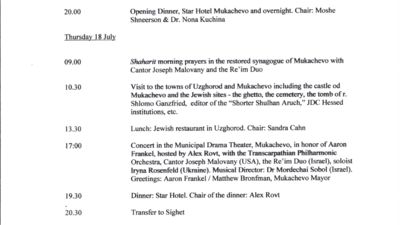
This document is the program for the Limmud FSU Global Leadership Summit, held in Sighet, Romania, from July 19-21, 2013, with initial activities in Mukachevo and Uzhgorod, Ukraine, starting July 17. The summit featured Nobel Laureate Prof. Elie Wiesel and a comprehensive schedule including morning prayers, visits to significant Jewish historical sites (such as the Jewish ghetto, cemetery, and Wiesel Museum), concerts, and various panel discussions. Key themes addressed in the panels included the Holocaust, the contemporary meaning of Judaism, the transition from "Jews of Silence to Jews of Hope," Prof. Wiesel's life journey, "The Jews of Romania and the Land of Israel," and "Zionism and Anti-Semitism." Notable participants and speakers included Dr. Julius Berman, Prof. Aaron Ciechanover, Knesset Speaker Yuli Edelstein, Prof. Alan Dershowitz, Prof. Deborah Lipstadt, along with a range of cantors, rabbis, and community leaders. The program also highlighted messages from Presidents Barak Obama and Shimon Peres.
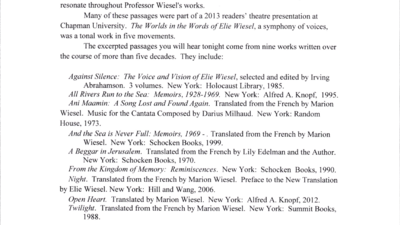
This document is a program for an "Evening of Holocaust Remembrance" held at Chapman University, featuring readings from the works of Elie Wiesel. It includes a detailed biography of Elie Wiesel, highlighting his life as a writer, teacher, Nobel Peace Prize laureate, and human rights advocate, with a focus on his experiences during the Holocaust. The program lists the performers (singers, instrumentalists, and readers) and the creative and production team involved in the event. It presents selected texts from Wiesel's works, emphasizing themes of memory, the Holocaust, and the human capacity to remember and confront oblivion. The event, which included the lighting of remembrance candles, took place during the week of April 12-19, 2015, and aimed to commemorate the millions who perished in the Holocaust and honor survivors and rescuers, while promoting justice and human rights through the power of memory and storytelling.
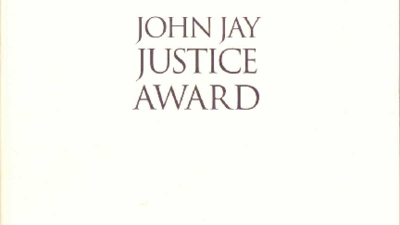
This document is a program for the 2014 John Jay Justice Awards, held on May 6, 2014. The event honors Elie Wiesel for his profound dedication to justice and human rights, a commitment deeply rooted in his experiences as a Holocaust survivor. The program features a welcome message from Jeremy Travis, President of John Jay College, alongside a detailed biography of Wiesel, highlighting his literary works, academic career, and human rights advocacy. It also explains the significance of the John Jay Medal for Justice. The program outlines the ceremony's schedule, including performances and presentations by notable figures such as Stephen G. Breyer, Sir Patrick Stewart, James Earl Jones, Simon Estes, Gil Shaham, Akira Eguchi, Anthony McGill, and Jessye Norman. Biographical sketches of these presenters and participants are provided. The document concludes with acknowledgments to key contributors, including Anne Beane Rudman for underwriting the event and Caroline Stoessinger for producing the program, and lists the members of the John Jay College Foundation Board of Trustees.